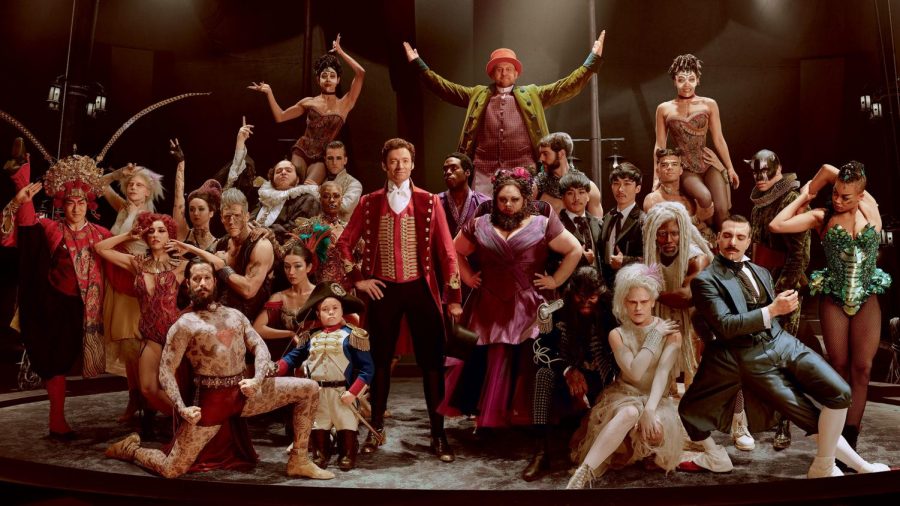Now showing: The Greatest Showman
January 2, 2018
At first glance, “The Greatest Showman” might seem like a recipe for success. With an all-star cast, an intriguing subject matter and sparkly high-production scenes, it has many of the ingredients for a great musical. But all of the film’s glitter and glitz does is hide an empty plot and mediocre songs, creating a forgettable film.
This rags-to-riches movie focuses on P.T. Barnum (Hugh Jackman), founder of the Barnum and Bailey Circus, as he attempts to fulfill his dreams and expand his success. To create his show, he hires a collection of misfits to perform, such as bearded lady Lettie Lutz (Keale Settle) and trapeze artist Anne Wheeler (Zendaya). Alongside his wife and childhood sweetheart Charity Barnum (Michelle Williams) and business partner Phillip Carlyle (Zac Efron), Barnum grows his circus into a cultural phenomenon.
The best part of “The Greatest Showman” is its visuals. The film is littered with colorful, dreamlike sequences, extravagant costumes and flashy dance numbers. One particular choreographic success is in Anne and Phillip’s duet, “Rewrite the Stars,” which involves the two flying through the air via trapeze while professing their love for one another. However, all of the film’s eye candy is, unfortunately, not enough to make up for a lackluster score and storyline.
With songs by the award-winning duo Benj Pasek and Justin Paul, the masterminds responsible for the music of “La La Land” and Broadway hit “Dear Evan Hansen,” one would expect “The Greatest Showman” to have an amazing soundtrack similar to the pair’s previous works. This is not the case, as the film’s songs, while catchy, sound too much like a cheesy pop album. The electro-pop sound might appeal to a mainstream audience, but for a historical movie musical, it did not create the right atmosphere.
That’s not to say that all of the songs were lacking. One of the more memorable songs, “This is Me,” features a powerful vocal performance from Settle and highlights one of the film’s more intriguing themes: the idea that you should be proud to be yourself no matter what you look like. However, this concept is brushed aside for the rest of the film, and the outcasts do not get the spotlight they deserve outside of this musical number.
It is ironic that a film which aimed to highlight individuality essentially lumps all of the “freaks” into one category and fails to give any of them a distinct backstory.
While a musical drama is by no means expected to be historically accurate, the fact that “The Greatest Showman” glazes over many of the darker aspects of the real P.T. Barnum’s life adds to the emptiness of the film. To see a historical figure who was known to exploit people’s disabilities be portrayed as the savior of the people he employed was disappointing and made the storyline lack resonance.
The fact that “The Greatest Showman” is a flashy feel-good film with little substance is not its biggest flaw. Plenty of movies are made purely for audience enjoyment and not to make dramatic social commentary. But where the movie falls flattest is in its multiple underdeveloped plotlines and complete lack of character development.
In addition to the poorly addressed outcast storyline, the relationship between Anne and Phillip is not explained or expanded on, and issues within the Barnum family are too simply resolved.
Overall, “The Greatest Showman” fails to compensate its mediocrity with its razzle-dazzle dance numbers and half-hearted storylines, amounting to a film that will do little more than provide an hour and a half of empty entertainment.









